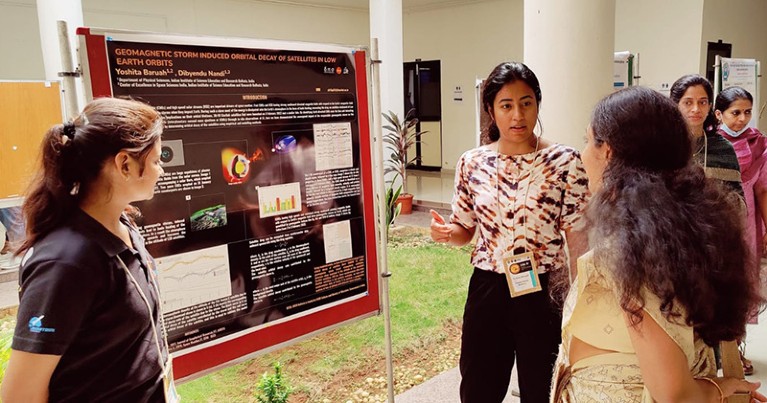
When not forecasting the solar weather, Yoshita Baruah (centre) enjoys sharing her knowledge.Credit: Dibyendu Nandi
Yoshita Baruah studies the solar storms that shape space weather, and forecasts when they might hit Earth or knock satellites off their orbits. Predicting the space weather around Earth, she says, will one day be as mainstream as forecasting the weather on the ground. When not immersed in satellite observations, Baruah engages with the Indian Network for Dynamical and Unified Solar Physicists (INDUS), a knowledge-sharing and networking platform for Indian solar physicists with more than 150 members.
What made you study space weather?
Astronomy always fascinated me as a student at school, but I wasn’t exposed to it enough to choose a niche to pursue until I came to the Indian Institute of Science Education and Research Kolkata. My PhD supervisor introduced me to the field of space weather and asked me to tinker around using my data-analysis skills.
Reading about the field, meeting people and producing science with impact piqued my interest. Explosive events such as solar flares and expulsions of plasma from the Sun called coronal mass ejections create beautiful auroras on Earth, but they can disrupt radio communications, for example.
When did the impact of space weather on society start to become clear?
It first became apparent in the 1850s, when we became more dependent on technology. In 1859, the Carrington Event — the most intense space-weather event in recorded history — caused the failure of telegraph communications around the world. Another big solar storm, in 1989, known as the Quebec blackout, damaged electrical power grids, leaving much of northeastern Canada without electricity for more than nine hours. In 2022, US spacecraft manufacturer SpaceX lost around 40 satellites because of a geomagnetic storm just a few days after the launch. Space-weather events do not directly affect human health, but our dependence on technology makes us vulnerable.
How do you assess space weather?
At the Center of Excellence in Space Sciences India (CESSI), we look at the Sun and the near-Sun environment using multiple spacecraft and at different wavelengths and from different vantage points. We use models along with the data to estimate the velocity of incoming coronal mass ejections and predict when they are going to reach Earth. We also track satellite data on the solar wind from near Earth at the L1 Lagrange point, a position between Earth and the Sun that provides an uninterrupted view of the Sun.
The CESSI machine-learning AI algorithm flags active regions on the Sun that have the potential to produce a solar flare. These analyses are assimilated into a weekly bulletin (www.cessi.in/spaceweather).
What skill sets are needed to work on space weather?
A lot of research on space weather uses satellite data. Most of the time, it boils down to assimilating, cleaning up and processing data before you can get to the science. Data-driven and physics-based models are important for predicting space weather and for understanding physical processes when data are scarce. So knowledge of coding, data analysis and statistics are essential.
What does a typical day in your life as a researcher look like?
I do a variety of tasks apart from working on projects for my PhD, such as routine assessments of space weather and outreach activities. Some days are better than others — when your code finally produces the anticipated result after hundreds of attempts, for example. Every day requires patience, perseverance and positivity. Working as part of a community at INDUS is also a big part of my professional life.
Tell us why being part of a community of solar physicists is important.
A network of people from your scientific community helps you not only academically — by getting help with techniques or data, keeping track of opportunities in the field and with general guidance — but also personally. Researchers from across the globe are part of INDUS. So as they progress in their careers and move to different parts of the world, they will already have a community to fall back on for support.


 India’s year in science
India’s year in science
 Where science meets Indian economics: in five charts
Where science meets Indian economics: in five charts
 Renewable energy for the subcontinent
Renewable energy for the subcontinent
 We need to talk about water
We need to talk about water
 The climate disaster strikes: what the data say
The climate disaster strikes: what the data say
 The fight against antimicrobial resistance
The fight against antimicrobial resistance
 How high-impact papers from Indian researchers are shaping science
How high-impact papers from Indian researchers are shaping science
 India struggles to turn science into societal benefits
India struggles to turn science into societal benefits
 Big ideas: India’s drive to stem the brain drain
Big ideas: India’s drive to stem the brain drain
 I study depression in the lab and advocate for mental health in academia
I study depression in the lab and advocate for mental health in academia






